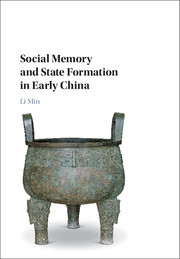Book contents
- Social Memory and State Formation in Early China
- Frontispiece
- Social Memory and State Formation in Early China
- Copyright page
- Dedication
- Contents
- Foreword
- Acknowledgments
- Chapter One Wen Ding
- Chapter Two Frames of Reference
- Chapter Three Before the Central Plains
- Chapter Four The Longshan Transition
- Chapter Five The Rise of the Luoyang Basin and the Production of the First Bronze Ding Vessels
- Chapter Six The Rise of the Henei Basin and the Limit of Shang Hegemony
- Chapter Seven The Rise of the Guanzhong Basin and the Birth of History
- Chapter Eight The World of Yu’s Tracks
- Chapter Nine Conclusion
- Notes
- Bibliography
- Index
Chapter Nine - Conclusion
The Emergence of the Classical Tradition
Published online by Cambridge University Press: 14 May 2018
- Social Memory and State Formation in Early China
- Frontispiece
- Social Memory and State Formation in Early China
- Copyright page
- Dedication
- Contents
- Foreword
- Acknowledgments
- Chapter One Wen Ding
- Chapter Two Frames of Reference
- Chapter Three Before the Central Plains
- Chapter Four The Longshan Transition
- Chapter Five The Rise of the Luoyang Basin and the Production of the First Bronze Ding Vessels
- Chapter Six The Rise of the Henei Basin and the Limit of Shang Hegemony
- Chapter Seven The Rise of the Guanzhong Basin and the Birth of History
- Chapter Eight The World of Yu’s Tracks
- Chapter Nine Conclusion
- Notes
- Bibliography
- Index
Summary
- Type
- Chapter
- Information
- Social Memory and State Formation in Early China , pp. 469 - 486Publisher: Cambridge University PressPrint publication year: 2018



